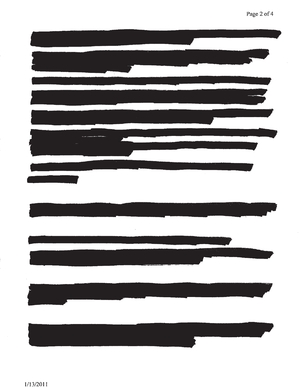|
Supreme Court ruling redacts FOIA
 In an opinion with potentially far-reaching implications, the Supreme Court of Virginia ruled Sept. 17 that courts should give “substantial weight” to government agency explanations for why a FOIA exemption applies to a request for records, and that only exemptions containing certain key phrases are required to redact non-exempt material. Both rulings ignore provisions to the contrary elsewhere in FOIA. In an opinion with potentially far-reaching implications, the Supreme Court of Virginia ruled Sept. 17 that courts should give “substantial weight” to government agency explanations for why a FOIA exemption applies to a request for records, and that only exemptions containing certain key phrases are required to redact non-exempt material. Both rulings ignore provisions to the contrary elsewhere in FOIA.
The case arises from Del. Scott Surovell’s attempt to gain access to records related to the Department of Corrections’ policies and procedures for administering the death penalty, particularly by the electric chair. In response to his request, the agency produced some records but not others. Surovell sued, and after a day-long hearing, the circuit judge ruled that the DOC could properly withhold some records, must disclose some records and must redact and disclose others.
Justice Cleo Powell, writing for a 5-2 majority, started out the legal analysis of the questions presented with a misstatement of the law…..
…continue reading on VCOG’s website.
The curious journey of an ABC report
 As reported in the September Sunshine Report, the Virginia Alcoholic Beverage Control refused to release the report prepared in response to the confrontation between ABC agents and UVA student Martese Johnson, a confrontation that bloodied Johnson’s face. The ABC, supported by the governor, said FOIA’s personnel policy “prohibited” the report’s release, a position not supported by the many references in FOIA to “discretionary” release. The administration then cited a personnel policy as the reason it couldn’t be released, even though policy doesn’t trump law. As reported in the September Sunshine Report, the Virginia Alcoholic Beverage Control refused to release the report prepared in response to the confrontation between ABC agents and UVA student Martese Johnson, a confrontation that bloodied Johnson’s face. The ABC, supported by the governor, said FOIA’s personnel policy “prohibited” the report’s release, a position not supported by the many references in FOIA to “discretionary” release. The administration then cited a personnel policy as the reason it couldn’t be released, even though policy doesn’t trump law.
The saga, and the public pressure to release the report — even a redacted version of it — continued on into September. Sen. Frank Wagner and Del. Todd Gilbert called on the governor to release the report and suggested a……
…continue reading on VCOG’s website.
Open government in the news
The Daily Press asked the state’s clerks of court for records related to the subscription agreements users sign to gain online access to various court records. Half provided the information, while 23 clerks didn’t respond within FOIA’s 5-day window and a dozen clerks said FOIA did not apply to them at all, despite a clear statement to the contrary in 2.2-3703(A)(5)….The Franklin County Sheriff’s office announced it would not release the 23-page manifesto faxed to ABC News by Vester Lee Flanagan II they same day he killed a WDBJ reporter and cameraman at Smith Mountain Lake. The sheriff said he was not going to allow Flanagan (who killed himself later that day) to “re-victimized these individuals and their families by making public his rambling correspondence.”…The University of Virginia withheld an independent review of how the university handled rape allegations depicted in a Rolling Stone article last year. UVA cited a federal official’s statement that the U.S. Department of Education’s Family Policy Compliance Office had a “strong interest” in the privacy of students and referred to the Family Education Rights and Privacy Act. Frank LoMonte of the Student Press Law Center (and VCOG board member) said the report could be release with student information redacted….The Attorney General of Virginia released on opinion in response to a query from Del. Chris Jones about whether the Suffolk Wetlands Board could have a public permit period during regularly scheduled meetings (as opposed to hearings that a statute may require). FOIA is silent on public comment periods, so the AG concluded that while the board did not have to, it may choose to do so “because of the overarching importance of open government and free discussion with citizens.”…The governor’s Task Force for Local Government Mandate Review recommended in its year-end report that a legislative amendment be sought to allow law enforcement to refuse to release video and audio recorded by body-warn cameras when release would disclose the identities and personal information of private citizens. The task force also recommended getting an exemption from records management retention schedules promulgated by the Library of Virginia….Governor Terry McAuliffe said Hillary Clinton should not have used a private email account for government business while serving as secretary of state. He also said that he maintains two separate accounts and carries two phones: one with state information, one with personal information….Franklin County supervisors met two-by-two with Mountain Valley Pipeline representatives to discuss erosion and sediment control. FOIA is not triggered when only two meet, provided those two are not members of a two- or three-member committee. Calling the move pragmatic, the county administrator said members will share the gathered information at a later public meeting. The administrator also noted that MVP “declined to” meet publicly….The judge hearing the FOIA case brought by four Pittsylvania County residents against the local Agricultural Development Board recused herself after the board’s attorney told her the county attorney would be a material witness in the case….The Supreme Court of Virginia announced it will no longer wait to release opinions on pre-selected days and will instead release them on a rolling basis, as they are “deemed ready,” according to an announcement on the court’s website….A special prosecutor was appointed to investigate allegations that Loudoun Sheriff Mike Chapman illegally obtained and published private emails of his opponent during their primary campaign. That opponent, Ron Speakman, alleges Chapman used FOIA to obtain private communications Speakman had with others contained on Fairfax County servers. Chapman countered with, “all that stuff is FOIA-able.”…Plaintiffs challenging the drawing of Virginia’s 3rd Congressional District failed in their attempt to get the 4th U.S. Circuit Court of Appeals to block the online posting of several different maps proposing new boundaries. The plaintiffs argued that publishing them on the Division of Legislative Services’ website would inappropriately invite more public comment into the legal proceedings….In the 2015 legislative session, a bill to shield disclosure of the identities of businesses that supply and compound drugs used in the lethal injection process, died on the House floor, meaning the information remains public in Virginia. In late September, the Associated Press reported that the Virginia Department of Corrections had obtained pre-compounded drugs from Texas, which has an information shield. |


 The Hampton Roads port city has been weathering a number of open government storms, the latest of which involved refusal of an interim police chief to speak in front of the press and adoption of a policy aimed at silencing members from speaking about matters discussed in closed session.
The Hampton Roads port city has been weathering a number of open government storms, the latest of which involved refusal of an interim police chief to speak in front of the press and adoption of a policy aimed at silencing members from speaking about matters discussed in closed session. In an opinion with potentially far-reaching implications, the Supreme Court of Virginia ruled Sept. 17 that courts should give “substantial weight” to government agency explanations for why a FOIA exemption applies to a request for records, and that only exemptions containing certain key phrases are required to redact non-exempt material. Both rulings ignore provisions to the contrary elsewhere in FOIA.
In an opinion with potentially far-reaching implications, the Supreme Court of Virginia ruled Sept. 17 that courts should give “substantial weight” to government agency explanations for why a FOIA exemption applies to a request for records, and that only exemptions containing certain key phrases are required to redact non-exempt material. Both rulings ignore provisions to the contrary elsewhere in FOIA.